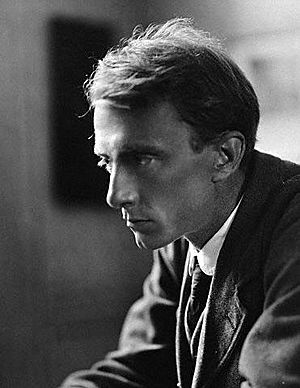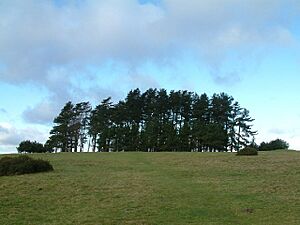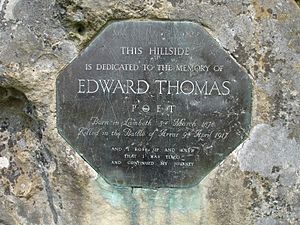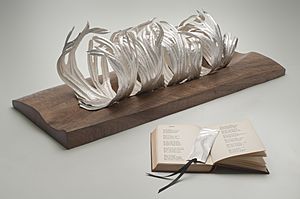Edward Thomas (poet) facts for kids
Quick facts for kids
Phillip Edward Thomas
|
|
|---|---|

Thomas in 1905
|
|
| Born | 3 March 1878 Lambeth, Surrey, England |
| Died | 9 April 1917 (aged 39) Arras, Pas-de-Calais, France |
| Pen name | Edward Thomas, Edward Eastaway |
| Occupation |
|
| Nationality | Welsh |
| Genre | Nature poetry, war poetry |
| Subject | Nature, war |
| Spouse |
Helen Noble
(m. 1899) |
| Children | 3 |
Edward Thomas (born March 3, 1878 – died April 9, 1917) was a talented British writer. He wrote both poems and prose (like essays and stories). Even though he joined the army during World War I, not many of his poems were directly about fighting. He started writing poetry when he was 36. But before that, he had already written many books and articles. These included works about nature, travel, and other writers. In 1915, he joined the British Army. Sadly, he died in France during the Battle of Arras in 1917. This happened soon after he arrived there.
Contents
Edward Thomas: Life and Writings
His Early Life and Welsh Roots
Edward Thomas was born in Lambeth, which is now part of south London. His parents were Mary Elizabeth Townsend and Philip Henry Thomas. His father was a civil servant, a writer, and a local politician.
Edward's family had strong connections to Wales. Most of his grandparents were born and grew up there. For example, his paternal grandparents lived in Tredegar. His grandfather worked there as a collier (coal miner). Edward's father, Philip Henry, was also born in Tredegar.
Even though his father left Wales when he was young, the family kept visiting relatives there. Edward Thomas also continued this tradition. He visited many family members and friends in places like Ammanford, Newport, and Swansea. He even had a long friendship with a distant cousin, John Jenkins (Gwili), who was a teacher and poet. They often walked together in the Welsh countryside.
From Oxford to Becoming a Poet
Edward Thomas studied history at Lincoln College, Oxford from 1898 to 1900. In 1899, while still at university, he married Helen Berenice Noble. He decided to make a living by writing.
He worked as a book reviewer, sometimes reviewing up to 15 books each week! He was already an experienced writer before World War I began. He wrote about literature, people's lives, and the countryside. He also wrote a novel called The Happy-Go-Lucky Morgans.
Thomas became good friends with the Welsh poet W. H. Davies. Edward Thomas helped Davies a lot with his writing career. For a time, Thomas lived with his family near Sevenoaks, Kent. He rented a small cottage nearby for Davies.
In 1906, Thomas and his family moved to Steep in East Hampshire. They liked the beautiful landscape there. They lived in Steep for ten years. Their third child, Myfanwy, was born in 1910.

Even though Thomas loved poetry and reviewed it often, he only started writing his own poems in late 1914. He first published his poems using the name Edward Eastaway. The American poet Robert Frost, who was living in England, really encouraged Thomas to write poetry. They became very close friends. They even planned to live next to each other in the United States.
Frost's famous poem, "The Road Not Taken", was inspired by walks with Thomas. Thomas often had trouble deciding which path to take.
In August 1914, Edward Thomas visited the village of Dymock in Gloucestershire. This village was home to several other writers, known as the Dymock poets.
Thomas also wrote a famous poem called "Adlestrop". It describes a moment when his train stopped at the Adlestrop railway station in the Cotswolds on June 24, 1914. This was just before World War I started.
His Time in the War
Edward Thomas joined the Artists Rifles in July 1915. He was a married man and older, so he didn't have to join the army. However, he decided to enlist. His friend Robert Frost, who had returned to the U.S., sent him an early copy of "The Road Not Taken". Frost meant the poem as a gentle joke about indecision. But Thomas took it very seriously. It helped him make the final decision to join the army.
Thomas was promoted to corporal. In November 1916, he became an officer, a second lieutenant, in the Royal Garrison Artillery. He was killed in action in Arras, France, on April 9, 1917.
To protect his wife Helen's feelings, she was told that he died from the shockwave of a shell, with no marks on his body. However, a letter found later from his commanding officer said that Thomas was actually "shot clean through the chest". His friend W. H. Davies was very sad about his death and wrote a poem about it.
Thomas is buried in the Commonwealth War Graves Cemetery in Agny, France.
His Family Life
Edward and Helen Thomas had three children: a son named Merfyn, and two daughters, Bronwen and Myfanwy.
After the war, Helen wrote two books about her life with Edward: As it Was (1926) and World Without End (1931). Their daughter Myfanwy later said that her mother wrote these books to help her cope with the sadness after Edward's death.
Helen also wrote a short memory of W. H. Davies. In 1988, many of Helen's writings were put together in a book called Under Storm's Wing. Myfanwy Thomas, who was only six when her father died, wrote her own book about her parents in 1982. It was called One of These Fine Days.
Remembering Edward Thomas
The Edward Thomas Fellowship was started in 1980. Its goal is to keep Edward Thomas's memory alive and encourage interest in his life and works.
Edward Thomas is honored in Poets' Corner at Westminster Abbey in London. There are also memorial windows in churches in Steep and Eastbury. Blue plaques mark places where he lived or was born in London and Oxford.
East Hampshire District Council created a "literary walk" in Steep dedicated to Thomas. It includes a memorial stone put up in 1935. The stone has a line from one of his essays: "And I rose up and knew I was tired and I continued my journey."
He is also remembered at the North East Surrey (Old Battersea) Cemetery.
A play about his life, called The Dark Earth and the Light Sky by Nick Dear, was first performed in London in 2012.
In February 2013, his poem "Words" was chosen as the poem of the week by Carol Rumens in The Guardian newspaper.
A special Study Centre dedicated to Edward Thomas has opened at Petersfield Museum. It has many books by and about him.
His Poetry
Edward Thomas's poems are written in a natural, everyday style. They often describe the English countryside. His short poem In Memoriam shows how he mixed themes of war and nature in his poetry.
On November 11, 1985, Thomas was one of 16 poets from World War I honored at Poets' Corner in Westminster Abbey. An inscription there, written by fellow poet Wilfred Owen, says: "My subject is War, and the pity of War. The Poetry is in the pity."
British Poet Laureate Ted Hughes once called Edward Thomas "the father of us all."
At least nineteen of Thomas's poems were turned into music by the composer Ivor Gurney.
A study center for Thomas is located at Petersfield Museum in Hampshire.
Selected Works
Poetry Collections
- Six Poems (under pseudonym Edward Eastaway) Pear Tree Press, 1916.
- Poems, Holt, 1917, which included "The Sign-Post"
- Last Poems, Selwyn & Blount, 1918.
- Collected Poems, Selwyn & Blount, 1920.
- Two Poems, Ingpen & Grant, 1927.
- Selected Poems of Edward Thomas. With an Introduction by Edward Garnett, Gregynog Press, 1927.
- The Poems of Edward Thomas, ed. R. George Thomas, Oxford University Press, 1978.
- Edward Thomas: Selected Poems and Prose, ed. David Wright, Penguin Books, 1981.
- Edward Thomas: A Mirror of England, ed. Elaine Wilson, Paul & Co., 1985.
- Edward Thomas: Selected Poems, ed. Ian Hamilton, Bloomsbury, 1995.
- The Poems of Edward Thomas, ed. Peter Sacks, Handsel Books, 2003.
- The Annotated Collected Poems, ed. Edna Longley, Bloodaxe Books, 2008.
Prose (Non-Poetry Books)
- Horae Solitariae, Dutton, 1902
- Oxford, A & C Black, 1903
- Beautiful Wales, Black, 1905
- The Heart of England, Dutton, 1906
- The South Country, Dutton, 1906
- Richard Jefferies: His Life and Work, Hutchinson, 1908
- Rest and Unrest, Dutton, 1910
- Light and Twilight, Duckworth, 1911
- Lafcadio Hearn, Houghton Mifflin Company (1912)
- The Icknield Way, Constable, 1913
- Walter Pater: A Critical Study, Martin Secker, 1913
- The Happy-Go-Lucky Morgans, Duckworth, 1913.
- In Pursuit of Spring Thomas Nelson and Sons, April 1914
- Four and Twenty Blackbirds Duckworth, 1915.
- A Literary Pilgrim in England, (UK: Methuen, US: Dodd, Mead and Company) 1917
- The Last Sheaf, Jonathan Cape, 1928
- A Language Not to Be Betrayed, Carcanet, 1981
- Autobiographies, Oxford University Press, 2011.
Sculpture
In December 2017, the National Museum of Wales in Cardiff showed a sculpture by artist Claire Malet. It showed a holloway (a sunken path) and included a copy of Thomas's Collected Poems. It was open to his poem 'Roads', which includes these lines:
- Crowding the solitude
- Of the loops over the downs,
- Hushing the roar of towns
- And their brief multitude.
See also
 In Spanish: Edward Thomas para niños
In Spanish: Edward Thomas para niños
 | Toni Morrison |
 | Barack Obama |
 | Martin Luther King Jr. |
 | Ralph Bunche |



